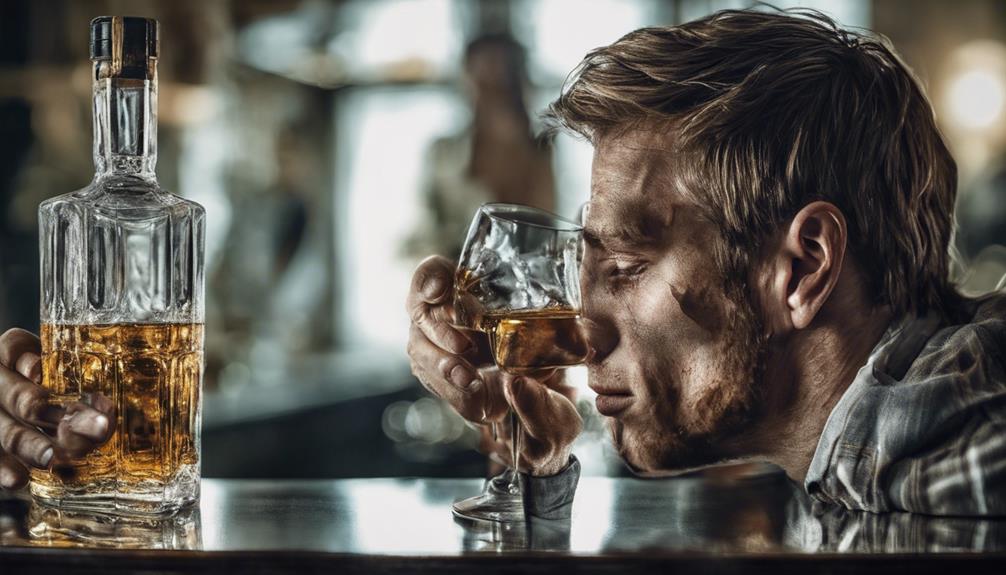As we explore the complex interplay between narcissists and alcohol use, we encounter a nuanced landscape where coping strategies and crutches intertwine.
Understanding the underlying motivations behind a narcissist's relationship with alcohol unveils a world of intricate psychological mechanisms that drive their behaviors.
Join us on this journey as we uncover the multifaceted ways in which alcohol serves as a dual-edged sword for individuals navigating the intricate realms of narcissism, offering both solace and potential pitfalls along the way.
Key Takeaways
- Vulnerable narcissists use alcohol to cope with insecurities and emotional pain.
- Alcohol serves as a temporary shield against criticism for vulnerable narcissists.
- Alcohol boosts confidence and acts as a social tool for vulnerable narcissists.
- Grandiose narcissists may use alcohol to show off and combat social anxiety.
Alcohol Use Among Narcissists
Approximately 22.6% of individuals with personality disorders may experience issues with substance misuse, and among them, narcissists, particularly those exhibiting grandiose or vulnerable traits, are more likely to face challenges related to alcohol use.
Research suggests that narcissists, especially those with grandiose tendencies, may turn to alcohol as a means of showcasing their perceived superiority or to alleviate social anxiety. On the other hand, vulnerable narcissists might resort to alcohol as a coping mechanism to deal with their deep-rooted insecurities and seek validation through temporary confidence boosts.
Understanding the correlation between narcissism and alcohol use is crucial in providing targeted support and interventions for individuals struggling with both personality traits and substance misuse.
Motivations Behind Narcissists' Drinking

Understanding the motivations behind narcissists' drinking behaviors sheds light on the complex interplay between personality traits and alcohol use. When examining the reasons behind narcissists' alcohol consumption, it becomes evident that different subtypes of narcissism drive individuals to drink for distinct purposes. Below is a table summarizing the primary motivations behind narcissists' drinking habits:
| Motivation | Description |
|---|---|
| Grandiosity | Seeking admiration and validation through alcohol |
| Insecurity | Using alcohol as a coping mechanism for anxiety |
| Social Presentation | Drinking to enhance social interactions |
Coping Mechanisms for Insecurities
Alcohol serves as a temporary confidence booster for vulnerable narcissists, aiding in the management of their insecurities by providing a false sense of empowerment. This coping mechanism allows them to momentarily escape feelings of inadequacy and self-doubt.
Vulnerable narcissists seek validation through alcohol, using it as a tool to negate their deep-rooted insecurities. By consuming alcohol, they create a facade of confidence that helps them navigate social interactions with more ease. This false sense of confidence acts as a shield against their inner vulnerabilities, offering a temporary reprieve from their emotional struggles.
While alcohol may provide a brief respite, it doesn't address the underlying insecurities that drive vulnerable narcissists to seek solace in its effects.
Emotional Regulation Through Alcohol

Using alcohol as a means to regulate emotions is a common strategy among vulnerable narcissists. For individuals grappling with intense emotional turmoil, alcohol often serves as a temporary reprieve. It acts as a buffer, shielding them from the harsh criticisms they fear, and numbing the pains of their hypersensitivity.
This coping mechanism provides a sense of emotional relief, albeit fleeting, allowing vulnerable narcissists to momentarily escape their inner turmoil. By creating a temporary shield against negative feelings, alcohol offers a semblance of control over their emotions.
However, it's crucial to note that reliance on alcohol for emotional regulation can exacerbate underlying issues and lead to a cycle of dependency, ultimately hindering genuine emotional growth and coping strategies.
Alcohol as a Social Tool
Utilizing alcohol as a social lubricant enables vulnerable narcissists to navigate social interactions with increased ease and confidence. In social settings, alcohol can help alleviate the intense anxiety and self-doubt experienced by vulnerable narcissists, allowing them to feel more comfortable and better equipped to engage with others.
By lowering inhibitions and reducing social apprehension, alcohol serves as a temporary confidence booster for individuals struggling with feelings of inadequacy. This enhanced confidence can facilitate smoother interactions, enabling vulnerable narcissists to participate more actively in social situations and potentially form connections they might otherwise struggle to establish.
While alcohol can aid in easing social discomfort, it's important to recognize the potential risks associated with relying on it as a primary tool for socializing.
Impact of Alcohol on Narcissists

When considering the impact of alcohol on narcissists, it's essential to evaluate the behavioral changes and potential consequences that may arise from their alcohol consumption.
- Increased Aggression: Alcohol can exacerbate narcissistic tendencies, leading to heightened levels of aggression and confrontational behavior.
- Impaired Judgment: Narcissists may struggle with impaired decision-making abilities when under the influence of alcohol, potentially leading to risky or reckless behaviors.
- Escalation of Narcissistic Traits: Alcohol consumption can amplify existing narcissistic traits, making individuals more self-centered, manipulative, and insensitive to others' needs.
Understanding how alcohol influences narcissistic behavior is crucial in addressing the challenges that arise from the combination of these factors.
Frequently Asked Questions
Can Alcohol Use Among Narcissists Be a Sign of a Deeper Underlying Issue Beyond Just Personality Traits?
Alcohol use among narcissists can indeed indicate deeper underlying issues beyond personality traits. It may serve as a coping mechanism or crutch to manage insecurities, emotional pain, and social anxieties. For some, alcohol offers temporary relief from self-doubt and criticism, providing a false sense of confidence.
Vulnerable narcissists, in particular, may turn to alcohol for emotional regulation and social facilitation, highlighting the complexity of their psychological needs.
How Does the Frequency of Alcohol Use Differ Between Grandiose and Vulnerable Narcissists?
When comparing the frequency of alcohol use between grandiose and vulnerable narcissists, we observe distinct patterns.
Grandiose narcissists may imbibe to flaunt their supposed superiority, while vulnerable narcissists often lean on alcohol as a means of coping with their deep-seated insecurities.
These differing motivations lead to varying levels of alcohol consumption, highlighting how the manifestation of narcissism influences individuals' drinking habits.
Are There Specific Warning Signs That Friends and Family Should Look Out for to Identify Alcohol Misuse in Narcissists?
When looking for signs of alcohol misuse in narcissists, we should observe changes in behavior like:
- Increased secrecy
- Defensive reactions
- Neglect of responsibilities
Pay attention to:
- Excessive drinking patterns
- Blackouts
- Irritability
- Withdrawal symptoms when alcohol isn't available
Keep an eye out for:
- Denial of a drinking problem
- Rationalizations for alcohol use
These warning signs can help friends and family identify potential alcohol misuse in narcissists and intervene appropriately.
Do Narcissists Who Engage in Alcohol Use Tend to Have More Difficulty in Maintaining Relationships Compared to Those Who Do Not?
When it comes to narcissists who engage in alcohol use, we've noticed that they may experience more challenges in maintaining relationships compared to those who don't.
This can be due to a variety of factors, such as their inflated sense of self and underlying insecurities that alcohol may either exacerbate or temporarily alleviate.
Understanding these dynamics can shed light on the complexities that influence their interpersonal interactions.
How Does the Impact of Alcohol on Narcissists Vary Depending on the Severity of Their Narcissistic Traits?
When looking at the impact of alcohol on narcissists, we observe varying effects based on the severity of their narcissistic traits.
Those with higher levels of narcissism might use alcohol to showcase their grandiosity or mask insecurities.
In contrast, narcissists with lower levels may turn to alcohol as a coping mechanism for managing emotional pain or social anxieties.
Understanding these distinctions can shed light on how alcohol interacts with different facets of narcissistic traits.
Conclusion
In conclusion, it can be inferred that alcohol serves as a dual-purpose tool for vulnerable narcissists, offering a temporary escape from insecurities while providing a facade of confidence.
The intricate relationship between narcissism and alcohol use reveals a complex interplay of coping mechanisms and emotional regulation.
Despite the facade of control, it's evident that alcohol serves as a subtle crutch for vulnerable narcissists, masking deeper vulnerabilities beneath the surface.










